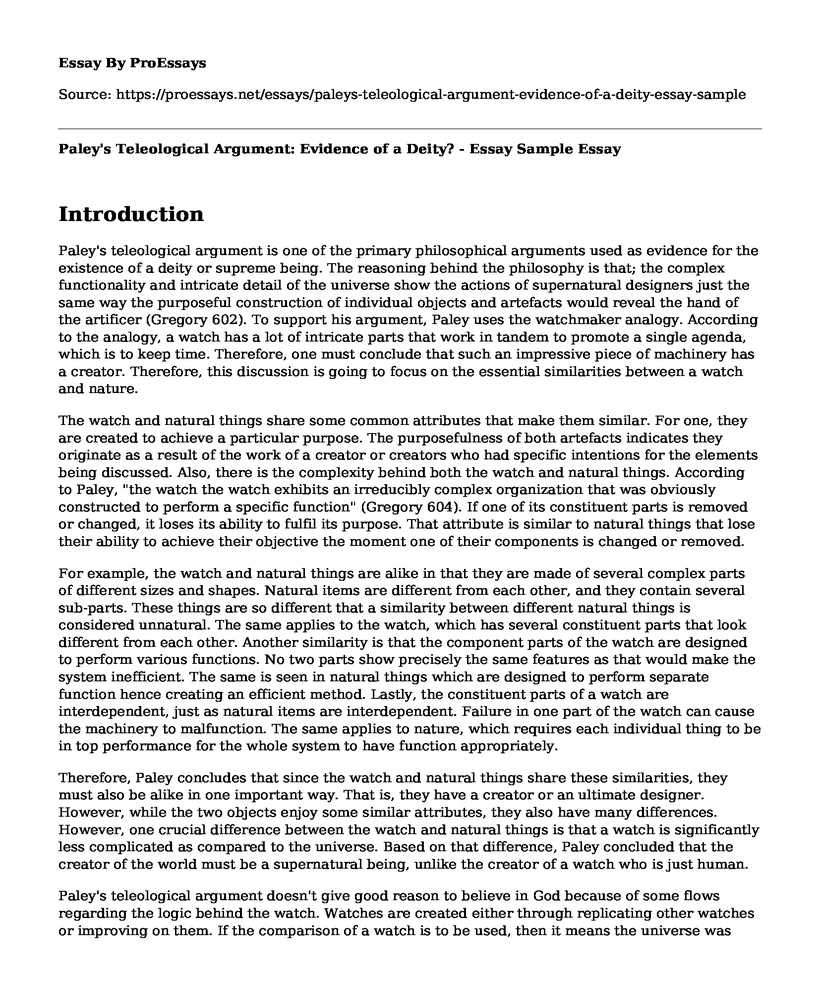Introduction
Paley's teleological argument is one of the primary philosophical arguments used as evidence for the existence of a deity or supreme being. The reasoning behind the philosophy is that; the complex functionality and intricate detail of the universe show the actions of supernatural designers just the same way the purposeful construction of individual objects and artefacts would reveal the hand of the artificer (Gregory 602). To support his argument, Paley uses the watchmaker analogy. According to the analogy, a watch has a lot of intricate parts that work in tandem to promote a single agenda, which is to keep time. Therefore, one must conclude that such an impressive piece of machinery has a creator. Therefore, this discussion is going to focus on the essential similarities between a watch and nature.
The watch and natural things share some common attributes that make them similar. For one, they are created to achieve a particular purpose. The purposefulness of both artefacts indicates they originate as a result of the work of a creator or creators who had specific intentions for the elements being discussed. Also, there is the complexity behind both the watch and natural things. According to Paley, "the watch the watch exhibits an irreducibly complex organization that was obviously constructed to perform a specific function" (Gregory 604). If one of its constituent parts is removed or changed, it loses its ability to fulfil its purpose. That attribute is similar to natural things that lose their ability to achieve their objective the moment one of their components is changed or removed.
For example, the watch and natural things are alike in that they are made of several complex parts of different sizes and shapes. Natural items are different from each other, and they contain several sub-parts. These things are so different that a similarity between different natural things is considered unnatural. The same applies to the watch, which has several constituent parts that look different from each other. Another similarity is that the component parts of the watch are designed to perform various functions. No two parts show precisely the same features as that would make the system inefficient. The same is seen in natural things which are designed to perform separate function hence creating an efficient method. Lastly, the constituent parts of a watch are interdependent, just as natural items are interdependent. Failure in one part of the watch can cause the machinery to malfunction. The same applies to nature, which requires each individual thing to be in top performance for the whole system to have function appropriately.
Therefore, Paley concludes that since the watch and natural things share these similarities, they must also be alike in one important way. That is, they have a creator or an ultimate designer. However, while the two objects enjoy some similar attributes, they also have many differences. However, one crucial difference between the watch and natural things is that a watch is significantly less complicated as compared to the universe. Based on that difference, Paley concluded that the creator of the world must be a supernatural being, unlike the creator of a watch who is just human.
Paley's teleological argument doesn't give good reason to believe in God because of some flows regarding the logic behind the watch. Watches are created either through replicating other watches or improving on them. If the comparison of a watch is to be used, then it means the universe was created through trial and error, just like watches. It means God is experimenting with the current world, and better universes can exist. That compromises one of the essential concepts of God's existence and image. It would mean that the creator is not all-powerful, all-loving, and all-knowing if He has to carry out trials and errors to create a perfect universe.
Works Cited
Gregory, T. Ryan. "The argument from design: a guided tour of William Paley's Natural Theology (1802)." Evolution: Education and Outreach 2.4 (2009): 602-611.
Cite this page
Paley's Teleological Argument: Evidence of a Deity? - Essay Sample. (2023, May 06). Retrieved from https://proessays.net/essays/paleys-teleological-argument-evidence-of-a-deity-essay-sample
If you are the original author of this essay and no longer wish to have it published on the ProEssays website, please click below to request its removal:
- Essay Analysis of Salvation by Langston Hughes
- Essay on the Impact of Religion and Spirituality to Medical Care
- Abraham's Life and Lessons Learned from Why God Chose Him Essay
- To What Extent Does Christianity Espouse Female Liberation? Essay
- Essay Example on Exploring Nietzsche's Meaning of Life
- Essay Sample on Exploring the Impact of Social Standards on My Identity
- Essay Example on Early Christian and Islam Art







